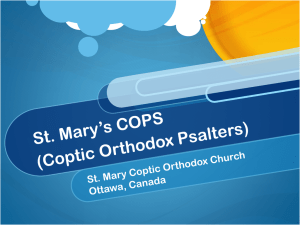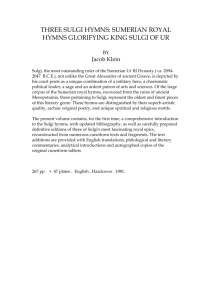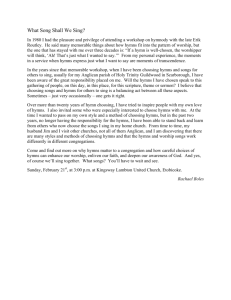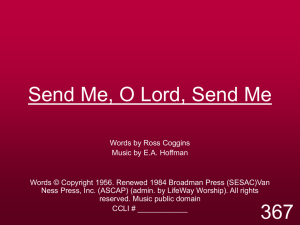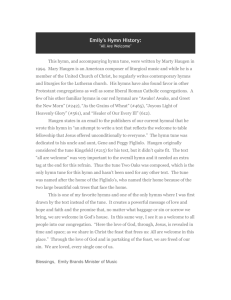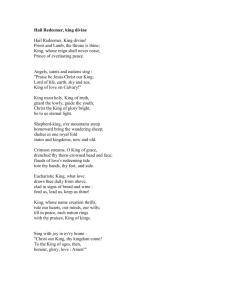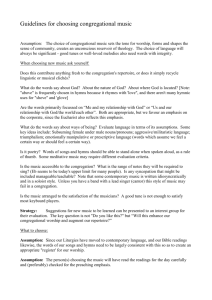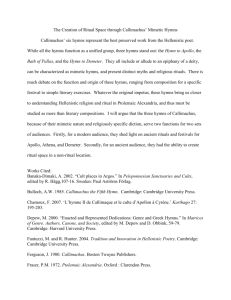Session 1-Early Church
advertisement
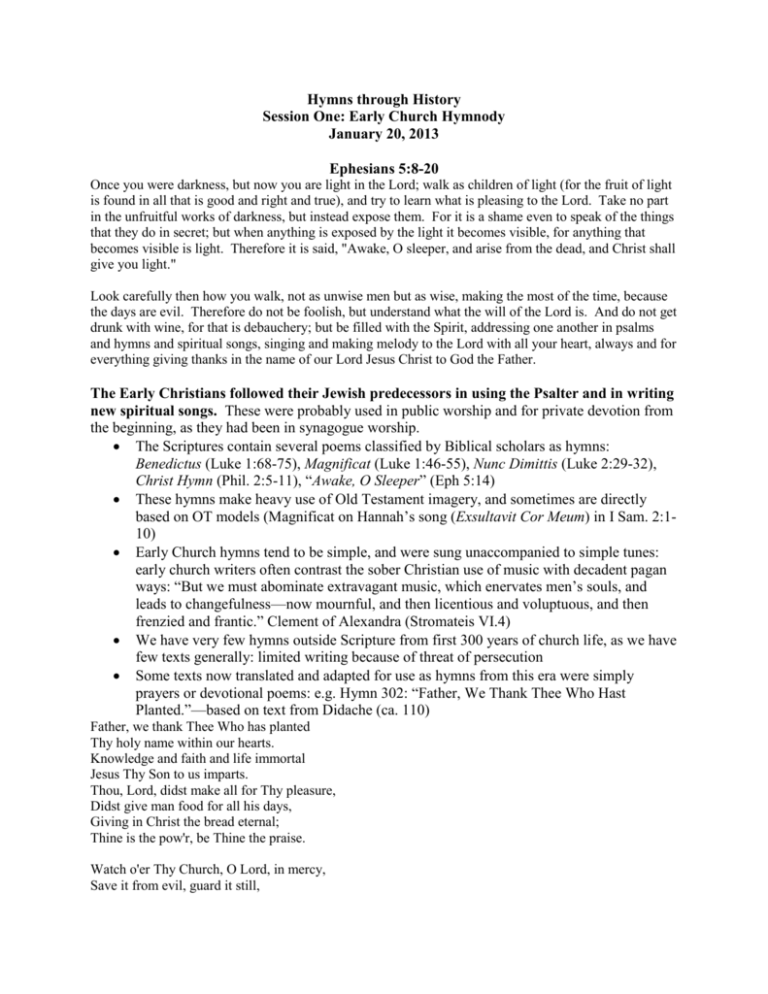
Hymns through History Session One: Early Church Hymnody January 20, 2013 Ephesians 5:8-20 Once you were darkness, but now you are light in the Lord; walk as children of light (for the fruit of light is found in all that is good and right and true), and try to learn what is pleasing to the Lord. Take no part in the unfruitful works of darkness, but instead expose them. For it is a shame even to speak of the things that they do in secret; but when anything is exposed by the light it becomes visible, for anything that becomes visible is light. Therefore it is said, "Awake, O sleeper, and arise from the dead, and Christ shall give you light." Look carefully then how you walk, not as unwise men but as wise, making the most of the time, because the days are evil. Therefore do not be foolish, but understand what the will of the Lord is. And do not get drunk with wine, for that is debauchery; but be filled with the Spirit, addressing one another in psalms and hymns and spiritual songs, singing and making melody to the Lord with all your heart, always and for everything giving thanks in the name of our Lord Jesus Christ to God the Father. The Early Christians followed their Jewish predecessors in using the Psalter and in writing new spiritual songs. These were probably used in public worship and for private devotion from the beginning, as they had been in synagogue worship. The Scriptures contain several poems classified by Biblical scholars as hymns: Benedictus (Luke 1:68-75), Magnificat (Luke 1:46-55), Nunc Dimittis (Luke 2:29-32), Christ Hymn (Phil. 2:5-11), “Awake, O Sleeper” (Eph 5:14) These hymns make heavy use of Old Testament imagery, and sometimes are directly based on OT models (Magnificat on Hannah’s song (Exsultavit Cor Meum) in I Sam. 2:110) Early Church hymns tend to be simple, and were sung unaccompanied to simple tunes: early church writers often contrast the sober Christian use of music with decadent pagan ways: “But we must abominate extravagant music, which enervates men’s souls, and leads to changefulness—now mournful, and then licentious and voluptuous, and then frenzied and frantic.” Clement of Alexandra (Stromateis VI.4) We have very few hymns outside Scripture from first 300 years of church life, as we have few texts generally: limited writing because of threat of persecution Some texts now translated and adapted for use as hymns from this era were simply prayers or devotional poems: e.g. Hymn 302: “Father, We Thank Thee Who Hast Planted.”—based on text from Didache (ca. 110) Father, we thank Thee Who has planted Thy holy name within our hearts. Knowledge and faith and life immortal Jesus Thy Son to us imparts. Thou, Lord, didst make all for Thy pleasure, Didst give man food for all his days, Giving in Christ the bread eternal; Thine is the pow'r, be Thine the praise. Watch o'er Thy Church, O Lord, in mercy, Save it from evil, guard it still, Perfect it in love, unite it, Cleansed and conformed unto Thy will. As grain, once scattered on the hillsides, Was in this broken bread made one, So from all lands Thy church be gathered Into Thy kingdom by Thy Son. The Conversion of Constantine in 312 brought a flowering of hymn writing, as it did with other arts and theological writing: Thematic hymns written on the deeds of the saints to be sung by the crowds who gathered for vigils at their tombs In age of theological controversy, hymns were used to teach controversial doctrines The development of feasts and festival seasons (Christmas, Easter, Pentecost) called for hymns that would interpret the meaning of the feasts to the faithful Grander church buildings and possibility of public liturgies lead to more elaborate worship services demand new burst of more theologically sophisticated hymns Several important early Christian theologians were also noted hymn writers: Clement of Alexandria, Ambrose of Milan, Gregory of Nazianzen, Romanus More hymns from this era are preserved because they were incorporated into the Eucharist (Gloria, Agnus Dei), or Daily Office (Hymns for 8 fold times of prayer and 2-3 special hymns for feasts): Ambrose’s (d. 397) “O Splendor of God’s Glory Bright” became office hymn for Monday Lauds O splendor of God's glory bright, O thou that bringest light from light, O Light of Light, light's living spring, O Day, all days illumining. O thou true Sun, on us thy glance let fall in royal radiance, the Spirit's sanctifying beam upon our earthly senses stream. The Father, too, our prayers implore, Father of glory evermore; the Father of all grace and might, to banish sin from our delight. To guide whate'er we nobly do, with love all envy to subdue, to make ill-fortune turn to fair, and give us grace our wrongs to bear. General Characteristics of Early Church hymns: Generally hymns of praise Strong Biblical imagery and Trinitarian theology Clear, sober, vigorous use of images
